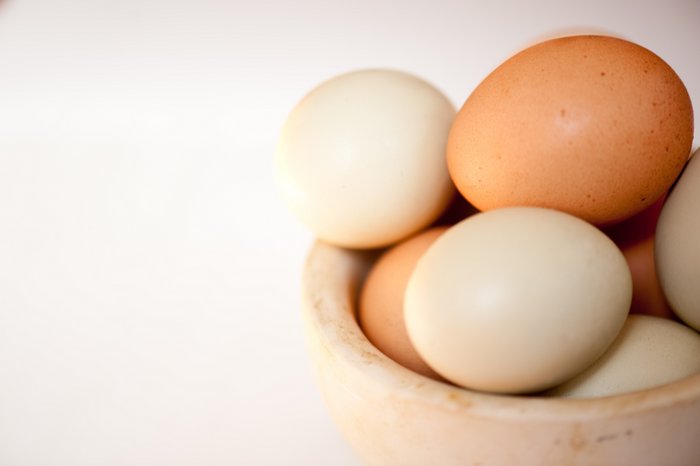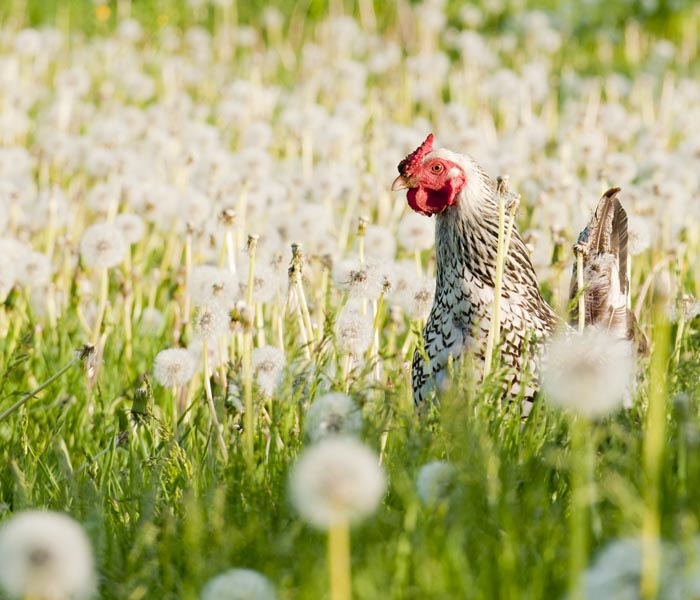What is a “pastured egg”? It’s an egg from a chicken raised outdoors on green pastures, able to forage for bugs, worms, grass, legumes, and any other greens and seeds it can find. There’s a world of difference between eggs from pastured hens and those from commercial, cage-free, “free-range,” and even certified organic (factory) farms. Here are a few of the major benefits:
- Eggs from hens raised on pasture are healthier. Over multiple studies, pastured-eggs have been found to contain 1/3 less cholesterol, 1/4 less saturated fat, 2/3 more vitamin A, at least 3 times more omega-3 fatty acids (and in a better ratio to omega-6s), 3 times more vitamin E, and 7 times more beta carotene than their conventional, commercial counterparts. The eggs are healthier because the hens’ diet, including greens and other natural foods, is healthier.
- Pastured eggs taste better. Richer and more flavorful, people readily pick up on the difference in taste. They look better too, with their bright golden yolks—a result of the healthful compounds like beta carotene.
- Hens on pasture produce eggs that are better for cooking. The yolks are firmer, and stand up higher and hold up better when frying. Whites are less runny, and whip up beautifully. Baked-goods and souffles have more volume, and omelets and poached eggs hold together well. Shells are often harder too.
- Raising hens outdoors on pasture is more humane and natural. These chickens have fresh air and sunshine (along with shelter from the elements), and have ample room to roam and run and stretch and scratch. They have a natural varied diet, being able to graze and forage on whatever nutritious plants they like and protein-packed bugs and worms they can find.
- Pastured eggs are honest and ethical eggs. Other industrial, supermarket-variety eggs often leave much to be desired. Standard commercial laying hens are raised in cages and fed a standardized conventional diet with low-level antibiotics. Contaminants likes salmonella are unfortunately not uncommon. “Cage-free” or “free-range” eggs may be a step above, but the meaning may be misleading. “Free-range” hens merely need to have “access to the outdoors,” which may be only a dirt or concrete yard affixed to factory-housing, “outdoors” which hens may not actually use. While certified-organic eggs do come from cage-free chickens not fed hormones, antibiotics, or GMO feeds (and their feed is raised without chemical fertilizers or pesticides), their diet is still only a standardized grain-and-soy mix, and doesn’t confer the same health and taste benefits as a true pastured egg.
- Buying pastured-eggs from local farms and farmers supports them and their sustainable practices. More money stays in the community, rather than funding industrial factory farming. Sustainable farms are better for the environment and keep the landscape picturesque and pastoral.
At Woven Meadows farm, we strive to produce healthy, delicious food that nourishes bodies, minds, communities, and the environment. Our healthy eggs come from laying hens raised outdoors on pasture, joined by the cows, pigs, turkeys, and any other animals we raise. We feed certified-organic grains and feeds in order to better support sustainable farming practices, reduce the use of harmful and polluting chemical fertilizers and pesticides, and avoid GMOs. We aim to farm sustainably, ethically, and humanely, weaving together farm, family, community, and land.


